专四强化训练
大学英语四级强化训练指导书.doc
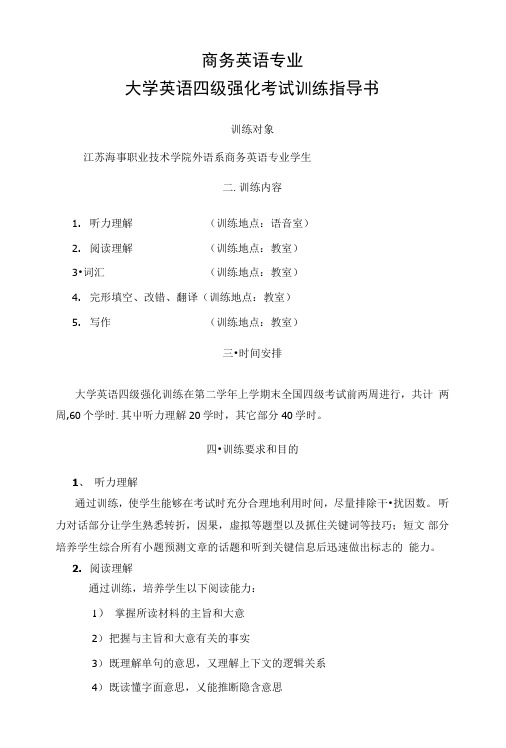
商务英语专业大学英语四级强化考试训练指导书训练对象江苏海事职业技术学院外语系商务英语专业学生二.训练内容1.听力理解(训练地点:语音室)2.阅读理解(训练地点:教室)3•词汇(训练地点:教室)4.完形填空、改错、翻译(训练地点:教室)5.写作(训练地点:教室)三•时间安排大学英语四级强化训练在第二学年上学期末全国四级考试前两周进行,共计两周,60个学时.其屮听力理解20学时,其它部分40学时。
四•训练要求和目的1、听力理解通过训练,使学生能够在考试时充分合理地利用时间,尽量排除干•扰因数。
听力对话部分让学生熟悉转折,因果,虚拟等题型以及抓住关键词等技巧;短文部分培养学生综合所有小题预测文章的话题和听到关键信息后迅速做出标志的能力。
2.阅读理解通过训练,培养学生以下阅读能力:1)掌握所读材料的主旨和大意2)把握与主旨和大意有关的事实3)既理解单句的意思,又理解上下文的逻辑关系4)既读懂字面意思,乂能推断隐含意思5)根据上卜•文判断词汇、短语、句了的特定含义6)领会作者的观点、态度、意图。
通过训练,培养学生以下阅读方法:1)快读2)查读3)细读通过训练,培养学生以下基本应试技巧:1)熟练吋间分配2)注意解题顺序3)灵活采用解题方法3.词汇通过训练,培养学生以下解题思路:1)弄清题义,抓住线索2)分析选项结构,合理推断3)去掉干扰,缩小选择范围,突岀答案4)孤立生词,迂回判断通过训练,让学生熟悉以下题型:1)难词辨义2)近义词辨析3)短语辨析4)固定搭配5)形(音)相近易混词辨析4.改错通过训练,让学生熟悉以下题型:1)词汇错误用词不当搭配错误词性错误漏词或赘词方面的错误2)语法错误一致问题非谓语动词用法连接词的用法时态、语态和语气5.完形填空通过训练,让学生熟悉以下题型:1)设置语义干扰2)习惯用法3)参照上下文的逻辑关系(转折,因果,递进,对比, 词汇)语法知识, 通过训练,让学生掌握以下技巧:1)通读全文,从整体角度掌握文章内容2)联系上下文,捕捉线索词3)充分利用语法知识,确保语法结构正确4)灵活处理6.写作通过训练,让学生掌握基本写作步骤:1)审题2)构思与捉纲3)成文4)修改通过训练,让学生掌握基本要领和技巧:1)文章的结构和组织2)开头3)主题句4)结尾5)统一性和连贯性6)过度词语的运用五.训练方案1•精讲多练。
《英语专业四级专项指导及训练》答案 (2)
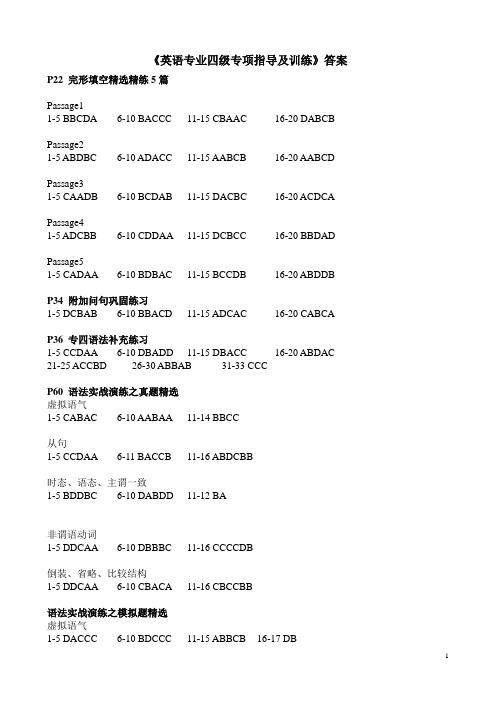
《英语专业四级专项指导及训练》答案P22 完形填空精选精练5篇Passage11-5 BBCDA 6-10 BACCC 11-15 CBAAC 16-20 DABCB Passage21-5 ABDBC 6-10 ADACC 11-15 AABCB 16-20 AABCD Passage31-5 CAADB 6-10 BCDAB 11-15 DACBC 16-20 ACDCA Passage41-5 ADCBB 6-10 CDDAA 11-15 DCBCC 16-20 BBDAD Passage51-5 CADAA 6-10 BDBAC 11-15 BCCDB 16-20 ABDDB P34 附加问句巩固练习1-5 DCBAB 6-10 BBACD 11-15 ADCAC 16-20 CABCA P36 专四语法补充练习1-5 CCDAA 6-10 DBADD 11-15 DBACC 16-20 ABDAC 21-25 ACCBD 26-30 ABBAB 31-33 CCCP60 语法实战演练之真题精选虚拟语气1-5 CABAC 6-10 AABAA 11-14 BBCC从句1-5 CCDAA 6-11 BACCB 11-16 ABDCBB时态、语态、主谓一致1-5 BDDBC 6-10 DABDD 11-12 BA非谓语动词1-5 DDCAA 6-10 DBBBC 11-16 CCCCDB倒装、省略、比较结构1-5 DDCAA 6-10 CBACA 11-16 CBCCBB语法实战演练之模拟题精选虚拟语气1-5 DACCC 6-10 BDCCC 11-15 ABBCB 16-17 DB从句1-5 DBACB 6-10 CDDCA 11-15 BCCDB 16-20 BDDBB 21-24 CBDD26-30 DCCCA 31-35 DDCBD 36-39 ACCC时态、语态、主谓一致1-5 BCBBA 6-10 DCABD 11-15 ABABD 16-20 DBCBC 21-26 CBDBCC非谓语动词1-5 CCBCD 6-10 BBBAD 11-15 CCCBC 16-20 BBDAB 21-25 BDBAA 26-30 BDBAB 31-35 BDBBD 36-40 DDCBD倒装、省略、比较结构1-5 CBBAB 6-10 ABDAB 11-15 DCBDC 16-20 BDABB 21-25 DACAB 26-30 ADADA 31-35 ACDBD 36-38 BDA其它1-5 BCBCB 6-10 DCBCC 11-15 CACBD 16-20 AACCB 21-25 BBCBC 26-30 BBDCA 31-33 DBD词汇实战演练之真题精选动词1-5 BCBBA 6-10 DAABA 11-15 CABDA 16-17 CA形容词1-5 CDDDB 6-10 CAACA 11-15 ABABC 16-17 BD名词1-5 CDBAB 6-10 ADADC 11-13 ACB固定搭配及其它1-5 DCADA 6-10 BAACB 11-15 DABBD 16-17 CD词汇实战演练之模拟题精选动词1-5 DABBD 6-10 DCBBC 11-15 ADDBB 16-20 CADCA 21-25 BCABA 26-30 BDABC 31-35 BDCDC 36-40 CBCCC 41-45 CCDDB 46-50 AADBC 51-55 AABBA 56-60 ABCCB 61-65 CBCDC 66-69 BDBD形容词1-5 BADBC 6-10 DBBCC 11-15 ADCAD 16-20 CCBAC 21-25 CBBDC 26-30 ADDCD 31-35 ABCCD 36-40 CACCB 41-45 ADDDC 46-50 CBDAA 51-55 ABBBD 56-58 BAC名词1-5 CBBBD 6-10 BCABD 11-15 BCCCC 16-20 DCDDA 21-25 DACAA26-30 DBBAA 31-35 ADBAA 36-40 DBCAC 41-45 BBDAD 46-50 CDDCC 51-54 BDBC固定搭配及其它1-5 ABCAC 6-10 CDDDD 11-15 BBDCA 16-20 BDBCA 21-25 BABAD 26-30 BAADC 31-35 BBDAC 36-40 CDCDB 41-45 CCAAB 46-50 DBACA 51-55. CBBDC 56-60 CBDDD 61-65 CCACC 66-70 DBADD 71-75 CCCAC 76-80 BADCD 81-84 CACA。
专四的练习题

专四的练习题专四考试是中国大学英语四级考试的简称,它是为了评估非英语专业学生的英语水平而设立的。
在备考过程中,解答练习题是一种有效的学习方法。
本文将为您提供一些专四的练习题,并附有详细解析,帮助您提高专四考试的应试能力。
I. 语法与词汇1. The new building, ________ construction started last year, will be completed next month.A. whoB. whichC. whoseD. where解析:答案选B。
本题是一个非限制性定语从句,修饰名词"building",故使用关系代词"which"。
2. The police are investigating the case, ________ is expected to be solved soon.A. whenB. whoC. whichD. what解析:答案选C。
本题是一个非限制性定语从句,修饰名词"case",故使用关系代词"which"。
3. It is essential that every student ________ the examination regulations.A. obeysB. will obeyC. obeyedD. obey解析:答案选A。
本题是一个虚拟语气的句子,需要用原形动词作谓语。
故选A。
II. 阅读理解阅读下面短文,然后根据短文内容选择最佳答案。
Chocolate has long been a popular treat throughout the world. The storyof chocolate began over 3,000 years ago in the ancient civilizations of Central America. The ancient Aztecs, who lived in what is now Mexico, believed that cacao beans (可可豆) were a gift from the gods and valued them highly. They used the cacao beans to brew a bitter, spicy drink for special occasions.Europeans first discovered chocolate when Christopher Columbus returned from his fourth and final voyage to the Americas. As it was brought back to Europe, the drink was adapted by adding sugar and other flavoringsto make it more enjoyable. By the 16th century, chocolate was consumed mainly in liquid form and was considered a luxury for the upper class.One of the key developments in the history of chocolate was the invention of solid chocolate in 1847 by British chocolatier Joseph Fry. This innovation made chocolate more accessible to the masses. Over time, various techniques were developed to improve the taste and texture of chocolate, including conching and tempering.In modern times, chocolate is enjoyed in many forms, including bars, truffles, and hot drinks. It is not only a tasty treat but also believed to have health benefits. Dark chocolate, in particular, is rich in antioxidants and has been linked to reduced risk of heart disease.4. According to the passage, the ancient Aztecs believed that cacao beans ________.A. had a bitter tasteB. were valuable giftsC. were used for making solid chocolateD. were brought from Europe解析:答案选B。
专四英语考试语法词汇强化训练
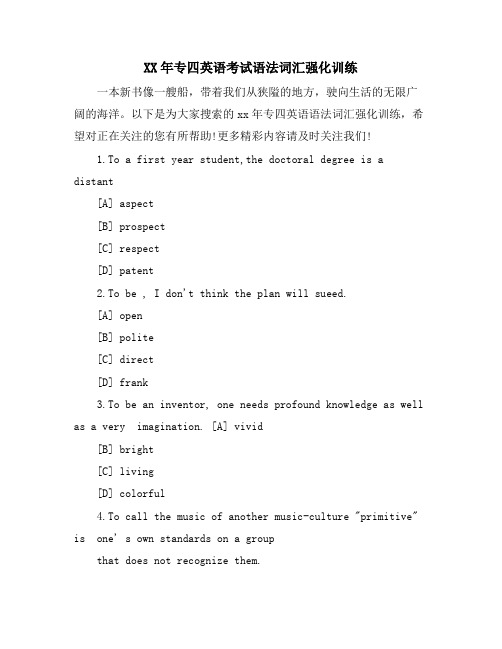
XX年专四英语考试语法词汇强化训练一本新书像一艘船,带着我们从狭隘的地方,驶向生活的无限广阔的海洋。
以下是为大家搜索的xx年专四英语语法词汇强化训练,希望对正在关注的您有所帮助!更多精彩内容请及时关注我们!1.To a first year student,the doctoral degree is adistant[A] aspect[B] prospect[C] respect[D] patent2.To be , I don't think the plan will sueed.[A] open[B] polite[C] direct[D] frank3.To be an inventor, one needs profound knowledge as well as a very imagination. [A] vivid[B] bright[C] living[D] colorful4.To call the music of another music-culture "primitive" is one' s own standards on a groupthat does not recognize them.[A] putting[B] emphasizing[C] forcing[D] imposing5.To get a better of the stage, we bad to change our seats.[A] look[B] scene[C] outline[D] view6.To his own surprise,John his driving test this time.[A] breezed through[B] saw through[C] ran through[D] pulled through7.To manufacture something is to turn it[A] up[B] over[C] on[D] out8.To my surprise, the house wh/ch looked rather shabby outside was luxuriously and furnished inside.[A] artificially[B] arbitrarily[C] arrogantly[D] artistically9.To survive in the intense Wade petition between countries, we must the qualities and varieties of products we make to the world-market demand.[A] improve[B] enhance[C] guarantee[D] gear10.To travel from Scotland to England you a passport.[A] needn't[B] mustn't need[C] don't need[D] isn't needing11.Unlike his brother, who does not like popular rausic,he is very it.[A] pleased with[B] fond of[C] delighted with[D] satisfied with12.Until then,his family from him for six months.[A] didn't hear[B] hasn't been hearing[C] hasn't heard[D] hadn't heard13.Upon the request of the audience,the speaker ,his voice.[A] raised[B] rose[C] arose[D] heightened14.Vegetables are an excellent of vitamins.[A] origin[B] source[C] beginnings[D] storage15.Very few people for his party at the last ele6don.[A] elected[B] preferred[C] chose[D] voted16.Very few scientists pletely new answers to the world's problems.[A] e up with[B] e out[C] e round[D] e up to17.Vistors are asked to with the regulations.[A] contrast[B] consult[C] ply[D] conflict18.Wait a minute.The police soon.[A] is ing[B] has e[C] are ing[D] have e19.Watching me pulling the calf awkwardly to the barn, the Irish milkmaid fought hard to her laughter.[A] hold back[B] hold on[C] hold out[D] hold up20.Water enters into a great variety of chemical reactions, have been mentioned in previous pages.[A] a few of it[B] a few of that[C] a few of them[D] a few of which模板,内容仅供参考。
英语专业四级考试辅导练习题

英语专业四级考试辅导练习题英语专业四级考试辅导练习题现在许多优秀的学生,他们天赋都很高吗?不,不是的,他们都是正常的智商,而正是凭着勤奋、靠着超人的努力,才取得了令我们惊叹的好成绩。
以下是店铺为大家搜索整理的英语专业四级考试辅导练习题,希望对正在关注的.您有所帮助!task 1Psychologists take opposing views of how external rewards, from warm praise to cold cash, affect motivation and creativity. Behaviorists, who study the relation between actions and their consequences, argue that rewards can __1__ performance at work and school. Cognitive( 认识派的 ) researchers, who study various aspects of mental life, maintain that rewards often destroy creativity by encouraging dependence on __2__ and gifts from others.The latter view has gained many supporters, __3__ among educators. But the careful use of small __4__ rewards speaks creativity in grade school children, suggesting that properly presented inducements( 刺激) indeed __5__inventiveness, according to a study in the June Journal of Personality and Social Psychology.“If kids know they’re working for a reward and can focus on a relatively __6__ task, they show the most creativity,” says Robert Eisenberger of the University of Delaware in Newark. “But it’s easy to __7__ creativity by giving rewards for poor performance or creating too much anticipation for rewards.A teacher who continually draws attention to rewards or who hands our high grades for __8__ achievement ends up with uninspired students, Eisenberger holds. As an example of thelatter point, he notes growing efforts at major universities to tighten grading standards and __9__ failing grades.In early grades, the use of so-called token economies, in which students handle challenging problems and receive performance-based points to ward valued rewards, shows __10__ in raising efforts and creativity, the Delaware psychologist claims.A)mentalB)promiseC)killD)avoidE)hopeF)especiallyG)aidH)ordinaryI)approvalJ)monetaryK)generallyL)improveM)challengingN)restoreO)excellenttask 21. Poll is an example of a severely disabled person who has become?______?at many survival skills.?A. efficientB. proficientC. persistentD. transient?2. Rumors are everywhere, spreading fear, damaging reputations, and turning calm situations into ?____? ones.?A. tragicB. turbulentC. vulnerableD. vicious?3. I believe that remark ?____? from what you said yesterday.?A. resultedB. aroseC. cameD. originated?4. Her ?____? was held at the local church.?A. funeralB. festivalC. farewellD. finish?5. Tom ?____? of his wife how she had met her friend.?A. askedB. questioned ?C. inquiredD. interrogated试题答案与解析1. B)【句意】波尔是个重残者掌握多种生存技能的典范。
大学生英语专业四级考试完形填空强化练习
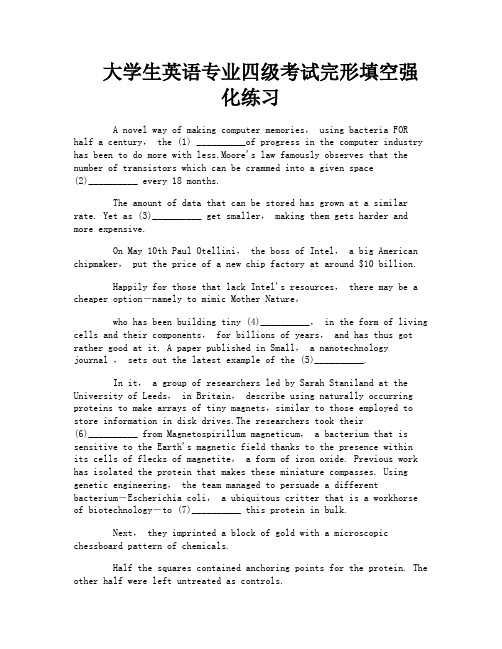
大学生英语专业四级考试完形填空强化练习A novel way of making computer memories, using bacteria FORhalf a century, the (1) __________of progress in the computer industry has been to do more with less.Moore's law famously observes that the number of transistors which can be crammed into a given space(2)__________ every 18 months.The amount of data that can be stored has grown at a similar rate. Yet as (3)__________ get smaller, making them gets harder and more expensive.On May 10th Paul Otellini, the boss of Intel, a big American chipmaker, put the price of a new chip factory at around $10 billion.Happily for those that lack Intel's resources, there may be a cheaper option―namely to mimic Mother Nature,who has been building tiny (4)__________, in the form of living cells and their components, for billions of years, and has thus got rather good at it. A paper published in Small, a nanotechnologyjournal , sets out the latest example of the (5)__________.In it, a group of researchers led by Sarah Staniland at the University of Leeds, in Britain, describe using naturally occurring proteins to make arrays of tiny magnets,similar to those employed to store information in disk drives.The researchers took their(6)__________ from Magnetospirillum magneticum, a bacterium that is sensitive to the Earth's magnetic field thanks to the presence withinits cells of flecks of magnetite, a form of iron oxide. Previous work has isolated the protein that makes these miniature compasses. Using genetic engineering, the team managed to persuade a different bacterium―Escherichia coli, a ubiquitous critter that is a workhorse of biotechnology―to (7)__________ this protein in bulk.Next, they imprinted a block of gold with a microscopic chessboard pattern of chemicals.Half the squares contained anchoring points for the protein. The other half were left untreated as controls.They then dipped the gold into a solution containing the protein, allowing it to bind to the treated squares, and dunked the whole lot into a heated (8)__________ of iron salts.After that, they examined the results with an electron microscope. Sure enough, groups of magnetite grains had materialised on the treated squares, shepherded into place by the bacterial protein.In principle, each of these magnetic domains could store the one or the zero of a bit of information, according to how it was polarised.Getting from there to a real computer memory would be a long road.For a start, the grains of magnetite are not strong enough magnets to make a useful memory, and the size of each domain is huge by modern computing (9)__________.But Dr Staniland reckons that, with enough tweaking, both of these objections could be dealt with.The (10)__________ of this approach is that it might not be so capital-intensive as building a fab.Growing things does not need as much kit as making them.If the tweaking could be done, therefore, the result might give the word biotechnology a whole new meaning. new meaning.A) components B) advantage C) standards D) compliments E) essence F) inspiration G) disadvantage H) doubles I) solution J) resolution K) devices L) manufacture M) spirit N) product O) technique参考答案:1.E)essence2.H)doubles3.A)components4.K)devices5.O)technique6.F)inspiration7.L)manufacture8.I)solution9.C)standards10.B)advantage。
华研外语2024英语专四预测听力强化

华研外语2024英语专四预测听力强化一、背景介绍华研外语作为国内知名的外语培训机构,一直以来致力于帮助学生提高英语水平,特别是针对英语专业四级考试,每年都会推出预测资料以帮助考生备考。
在2024年英语专四考试即将来临之际,华研外语针对考试听力部分推出了预测听力强化课程,以帮助考生在听力考试中取得更好的成绩。
二、课程介绍1. 课程目标本次预测听力强化课程旨在帮助学生提高听力理解能力,熟悉并掌握专四听力考试常见题型和解题技巧,提前预测可能出现的听力内容,为考试做好充分准备。
2. 课程内容(1)听力基础知识讲解:包括听力技巧、常见题型、常用词汇等基础知识的讲解,帮助学生建立听力基础,增强应试能力。
(2)听力强化训练:通过大量的听力练习,让学生熟悉各种听力题型,提高对英语语音、语调和语速的适应能力,训练学生快速捕捉信息的能力。
(3)预测听力内容分析:根据历年专四考试听力内容及趋势进行分析,预测可能出现的听力内容,帮助学生有针对性地备考。
3. 教学方式本课程采用多种教学方式,包括课堂讲解、模拟考试、听力训练等,以及教师的个性化辅导,让学生在轻松高效的氛围中提高听力水平。
三、课程特色1. 独家预测资料:华研外语拥有强大的教研团队和丰富的教学经验,结合多年的考试解剖分析,推出独家预测资料,为学生提供高质量的备考资料。
2. 定制化教学:根据学生的学习需求和听力水平,为每位学生定制个性化的听力强化学习计划,确保学生在短时间内取得显著的进步。
3. 多方位辅导:除了课堂授课外,学生还可通过上线学习评台进行每日练习和模拟考试,及时发现和纠正问题,提高学习效率。
四、课程优势1. 专业团队:本课程由经验丰富的专四听力教师授课,教学经验丰富,讲解清晰,能够帮助学生快速提高听力水平。
2. 优质服务:华研外语一直以来秉承“以学生为中心”的教学理念,提供优质的学习环境和服务,让学生在舒适愉快的氛围中学习。
3. 独特优势:华研外语以多年的教学积累和专业经验,为学生提供独特的听力强化课程,帮助他们在专四考试中脱颖而出。
专四听力talk专项训练
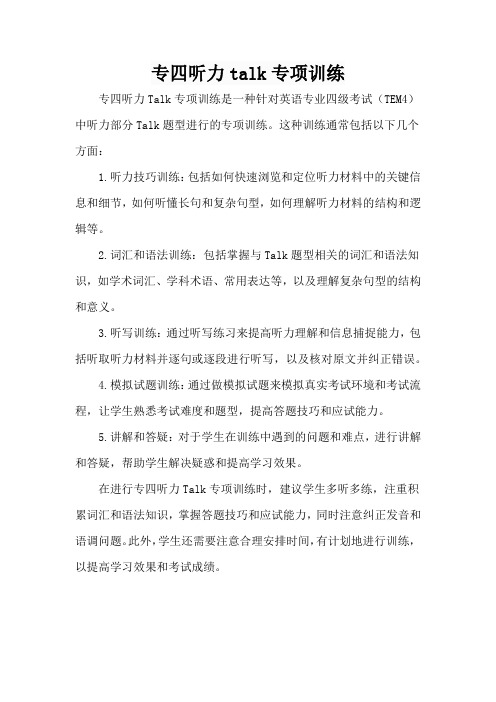
专四听力talk专项训练
专四听力Talk专项训练是一种针对英语专业四级考试(TEM4)中听力部分Talk题型进行的专项训练。
这种训练通常包括以下几个方面:
1.听力技巧训练:包括如何快速浏览和定位听力材料中的关键信息和细节,如何听懂长句和复杂句型,如何理解听力材料的结构和逻辑等。
2.词汇和语法训练:包括掌握与Talk题型相关的词汇和语法知识,如学术词汇、学科术语、常用表达等,以及理解复杂句型的结构和意义。
3.听写训练:通过听写练习来提高听力理解和信息捕捉能力,包括听取听力材料并逐句或逐段进行听写,以及核对原文并纠正错误。
4.模拟试题训练:通过做模拟试题来模拟真实考试环境和考试流程,让学生熟悉考试难度和题型,提高答题技巧和应试能力。
5.讲解和答疑:对于学生在训练中遇到的问题和难点,进行讲解和答疑,帮助学生解决疑惑和提高学习效果。
在进行专四听力Talk专项训练时,建议学生多听多练,注重积累词汇和语法知识,掌握答题技巧和应试能力,同时注意纠正发音和语调问题。
此外,学生还需要注意合理安排时间,有计划地进行训练,以提高学习效果和考试成绩。
英语四级真题强化训练
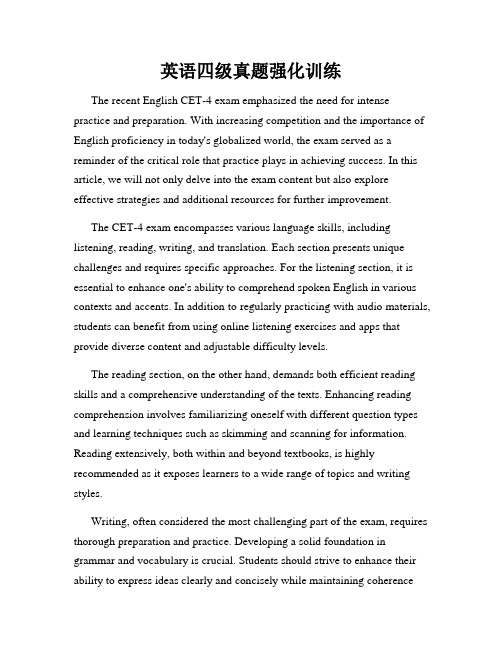
英语四级真题强化训练The recent English CET-4 exam emphasized the need for intense practice and preparation. With increasing competition and the importance of English proficiency in today's globalized world, the exam served as a reminder of the critical role that practice plays in achieving success. In this article, we will not only delve into the exam content but also explore effective strategies and additional resources for further improvement.The CET-4 exam encompasses various language skills, including listening, reading, writing, and translation. Each section presents unique challenges and requires specific approaches. For the listening section, it is essential to enhance one's ability to comprehend spoken English in various contexts and accents. In addition to regularly practicing with audio materials, students can benefit from using online listening exercises and apps that provide diverse content and adjustable difficulty levels.The reading section, on the other hand, demands both efficient reading skills and a comprehensive understanding of the texts. Enhancing reading comprehension involves familiarizing oneself with different question types and learning techniques such as skimming and scanning for information. Reading extensively, both within and beyond textbooks, is highly recommended as it exposes learners to a wide range of topics and writing styles.Writing, often considered the most challenging part of the exam, requires thorough preparation and practice. Developing a solid foundation in grammar and vocabulary is crucial. Students should strive to enhance their ability to express ideas clearly and concisely while maintaining coherenceand cohesion. Regular essay writing, with a focus on different essay types such as argumentative, descriptive, or narrative, can significantly improve writing skills. Seeking feedback from teachers or peers can also aid in identifying areas for improvement.Lastly, the translation section necessitates a solid understanding of vocabulary, grammar, and idiomatic expressions in both English and Chinese. Familiarizing oneself with different translation techniques and practicing with various types of texts can help students develop their translation skills. It is also beneficial to study vocabulary lists specific to translation as well as engage in regular translation exercises.To complement exam-specific preparation, utilizing additional resources can enhance overall English proficiency. English language podcasts, TV series, movies, and literature can aid in improving listening skills, expanding vocabulary, and developing cultural understanding. Online platforms and mobile apps offer various interactive exercises and language learning games that make studying enjoyable. Engaging with native English speakers through conversation exchange programs or online communities provides valuable opportunities for practicing spoken English.Furthermore, participating in English-speaking clubs, debates, or drama groups can boost confidence and fluency. Reading English newspapers, magazines, or online articles on a wide range of topics can improve both reading skills and general knowledge. Additionally, following English-language blogs or YouTube channels that focus on language learning tips and tricks can provide further guidance and motivation.In conclusion, the recent English CET-4 exam reminded us of the importance of intensive practice in achieving success. By focusing on individual sections and adopting effective strategies, such as regular listening exercises, extensive reading, and targeted writing and translation practice, students can significantly enhance their performance. Furthermore, utilizing additional resources and engaging in activities that promote exposure and interaction aids in overall language development. With dedication and persistence, success in the English CET-4 exam is within reach.。
英语专业四级考前冲刺练习(I)

There are thirty sentences in this section. Beneath each sentence there are four words or phrases marked A, B, C and D. Choose one word or phrase that best completes the sentence.Mark your answers on Answer Sheet Two.51. He advised Jane __ anyone about the shortages of food.A. not tellingB. not tellC. tell notD. not to tell52. He operates the new machine as if he __ special training in it.A. has receivedB. had receivedC. would receiveD. received53. It is very kind of you to do the washing-up, but you __ it.A. mustn't have doneB. shouldn't have doneC. oughtn't to have doneD. didn't have to do54. __., he does get annoyed with her sometimes.A. Although much he likes herB. Much although he likes herC. As he likes her muchD. Much as he likes her55. The newly broadened stadium is __ of the previous one.A. the size of three timesB. three times the sizeC. as much as the three times sizeD. three times more than the size56. I hope that the little __ I've been able to do has been of some use.A. whichB. whatC. thatD. when57. I like __ in the autumn when the weather is clear and bright.A. thisB. thatC. itD. one58. I like to play the piano but I can't play it well. ___ Sophie.A. As is the same withB It is the same withC. So it is the same asD. So is it with59. In vain __ to get in touch with the Embassy.A. they triedB. tried theyC. did they tryD. they have tried60. He had hardly finished the article __ the light went out.A. asB. untilC. thanD. when61. What a pity! Considering his ability and experience, he __ better.A. needn't have doneB. must have doneC. couldn't have doneD. couldn't have done62. "He's no more able to read Japanese than I am." The sentence means thatA. neither he nor I am able to read Japanese.B. I can read Japanese but he can't.C. my Japanese is better than him.D. both he and I are able to read Japanese.63. Which of the following can be used to complete "You'd better do it by yourself, __ you?"A. hadn'tB. wouldn'tC. didn'tD. don't64. In "What do you think he likes?" what is __ of the sentence.A. the subjectB. the adverbialC. the objectD. the complement65, "He is the last person to be fit for the job." hasall the following possible meanings EXCEPTA. He is the one that isn't fit for the job.B. He is the one that is not suitable for the job.C. He is the fittest person for the job.D. He might be the person that is least wanted.66. You shouldn't __ your father's instructions. Anyway he is an experienced teacher.A. deduceB. deliberateC. defyD. denounce67. The new underground railway will ___the journey to all parts of the city.A. consumeB. eliminateC. formulateD. facilitate68. The new" secretary has written a remarkably __ report only in a few pages but with all the details.A. conciseB. clearC. preciseD. elaborate69. Now a paper in Science argues that organic chemicals in the rock come mostly from __ on earth rather than bacteria on Mars.A. configurationB. constitutionC. condemnationD. contamination70. The city will __ these buildings to make room for the new highway.A. tear offB. tear outC. tear awayD. tear down71. If anyone wants to be __ by others, wealth, clothing or physical attractiveness are not requirements.A. respectfulB. respectiveC. respectableD. respected72. The little girl was so frightened that she justwouldn't __ her grip on my arm.A. loosenB. removeC. relieveD. dismiss73. Bob isn't __, but he did badly in the final exams last semester.A. gloomyB. dullC. awkwardD. tedious74. My tutor, frequently reminds me to ___ myself of every chance to improve my English.A. assureB. informC. availD. notify75. Fashion designers are rarely concerned with vital things like warmth, comfort and __A. stabilityB. capabilityC. durabilityD. availability76. Optimism is a ___ shown to be associated with good physical health, less depression and longer life.A. trailB. traitC. traceD. track77. The newly-elected president is determined to __ the established policy of developing agriculture.A. go forB. go onC. go byD. go up78. I am so busy that I only go home to visit my folks once in a blue moon. The italicized phrase means __A. rarelyB. barelyC. now and thenD. one a year79. A man's worth lies not___ in. what he has as in what he is.A. so muchB. much soC. too muchD. much too80. It is well known that knowledge is the __ condition for expansion of mind.A. incompatibleB. incredibleC. indefiniteD. indispensabl。
英语专业四级练习题
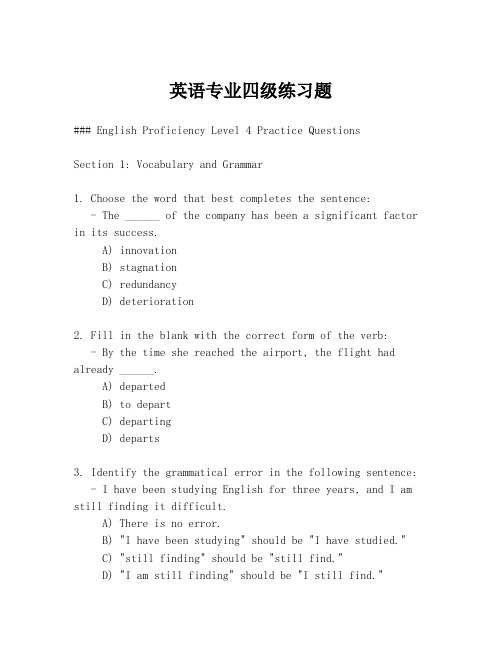
英语专业四级练习题### English Proficiency Level 4 Practice QuestionsSection 1: Vocabulary and Grammar1. Choose the word that best completes the sentence:- The ______ of the company has been a significant factor in its success.A) innovationB) stagnationC) redundancyD) deterioration2. Fill in the blank with the correct form of the verb:- By the time she reached the airport, the flight had already ______.A) departedB) to departC) departingD) departs3. Identify the grammatical error in the following sentence: - I have been studying English for three years, and I am still finding it difficult.A) There is no error.B) "I have been studying" should be "I have studied."C) "still finding" should be "still find."D) "I am still finding" should be "I still find."Section 2: Reading ComprehensionRead the following passage and answer the questions:In recent years, the popularity of online learning has surged, with millions of students enrolling in courses that offer flexibility and the ability to learn at one's own pace. However, the question of whether online education can truly replace traditional classroom learning remains a topic of debate.Questions:1. What is the main topic of the passage?A) The benefits of online learningB) The drawbacks of online learningC) The debate over the effectiveness of online learningD) The history of online learning2. According to the passage, what is one advantage of online learning?A) It is less expensive than traditional learning.B) It offers flexibility and self-paced learning.C) It is more interactive than classroom learning.D) It is more widely accepted by employers.3. What does the passage suggest about the future of education?A) It will be completely online.B) It will continue to be a blend of online andtraditional learning.C) It will revert to only traditional classroom learning.D) It is uncertain.Section 3: Listening ComprehensionYou will listen to a conversation between two students discussing their experiences with online courses. After listening, choose the best answer to each question.1. Why did the first student choose to take an online course?A) It was cheaper.B) It fit their schedule better.C) They didn't like their professor.D) They wanted to learn at their own pace.2. What was the second student's opinion about the difficulty of the online course?A) It was too easy.B) It was more challenging than expected.C) It was just right.D) It was too hard to understand.3. What did the students agree on regarding online learning?A) It is always better than traditional learning.B) It requires a lot of self-discipline.C) It is not suitable for all subjects.D) It is the only way to learn effectively.Section 4: WritingWrite an essay on the following topic:"The Impact of Technology on Education"- Discuss at least two ways in which technology has changed the educational landscape.- Consider the benefits and drawbacks of these changes.- Provide your opinion on whether technology enhances or hinders the learning process.Word Limit: 400-600 wordsThis practice test is designed to help English language learners prepare for a proficiency level 4 examination. It includes a variety of question types to assess different skills, including vocabulary, grammar, reading comprehension, listening comprehension, and writing. Good luck with your studies!。
英语专业四级语法专项训练
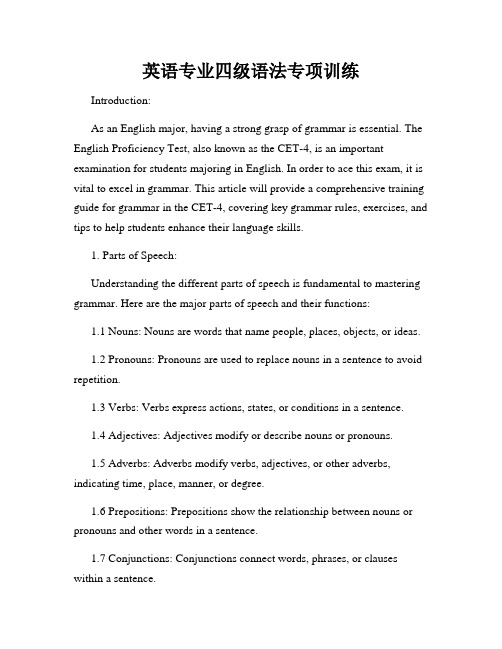
英语专业四级语法专项训练Introduction:As an English major, having a strong grasp of grammar is essential. The English Proficiency Test, also known as the CET-4, is an important examination for students majoring in English. In order to ace this exam, it is vital to excel in grammar. This article will provide a comprehensive training guide for grammar in the CET-4, covering key grammar rules, exercises, and tips to help students enhance their language skills.1. Parts of Speech:Understanding the different parts of speech is fundamental to mastering grammar. Here are the major parts of speech and their functions:1.1 Nouns: Nouns are words that name people, places, objects, or ideas.1.2 Pronouns: Pronouns are used to replace nouns in a sentence to avoid repetition.1.3 Verbs: Verbs express actions, states, or conditions in a sentence.1.4 Adjectives: Adjectives modify or describe nouns or pronouns.1.5 Adverbs: Adverbs modify verbs, adjectives, or other adverbs, indicating time, place, manner, or degree.1.6 Prepositions: Prepositions show the relationship between nouns or pronouns and other words in a sentence.1.7 Conjunctions: Conjunctions connect words, phrases, or clauses within a sentence.1.8 Interjections: Interjections are words or phrases used to express strong emotions.2. Sentence Structure:Understanding sentence structure is crucial for constructing grammatically correct sentences. Here's a breakdown of sentence components:2.1 Subject: The subject of a sentence is the person, place, thing, or idea that performs the action of the verb.2.2 Predicate: The predicate of a sentence includes the verb and all the words that provide information about the subject.2.3 Object: The object receives the action of the verb and can be either direct or indirect.2.4 Complement: A complement is a word or group of words that completes the meaning of a sentence.3. Tenses:Correctly using verb tenses is essential for effective communication. The English language has twelve tenses, categorized into three main groups:3.1 Present Tense: This tense refers to actions happening at the present time.3.2 Past Tense: The past tense is used to indicate actions that have already happened.3.3 Future Tense: The future tense is used to express actions that will happen at a later time.4. Sentence Patterns:Mastering different sentence patterns can greatly enhance the quality of written and spoken English. Here are some common sentence patterns:4.1 Subject + VerbExample: She sings.4.2 Subject + Verb + ObjectExample: They eat apples.4.3 Subject + Verb + ComplementExample: He is a teacher.4.4 Subject + Verb + Object + ComplementExample: She made him happy.4.5 Subject + Verb + Indirect Object + Direct ObjectExample: The teacher gave the students books.5. Common Grammar Mistakes:Knowing common grammar mistakes can help avoid errors in writing and improve overall language proficiency. Here are some frequently made mistakes and how to correct them:5.1 Confusing "Their," "There," and "They're"Example: Their book is on the table. (correct)There book is on the table. (incorrect)5.2 Misusing "Your" and "You're"Example: Your going to the party, right? (incorrect)You're going to the party, right? (correct)5.3 Errors in Subject-Verb AgreementExample: The dog and the cat is playing. (incorrect)The dog and the cat are playing. (correct)Conclusion:Mastering grammar is essential for success in the English Proficiency Test. By understanding the various parts of speech, sentence structure, verb tenses, sentence patterns, and common grammar mistakes, students can enhance their grammar skills significantly. Continuous practice, regular self-assessment, and seeking guidance from teachers or language resources will aid in achieving proficiency in grammar for the CET-4 exam and beyond.。
英语专业四级练习题
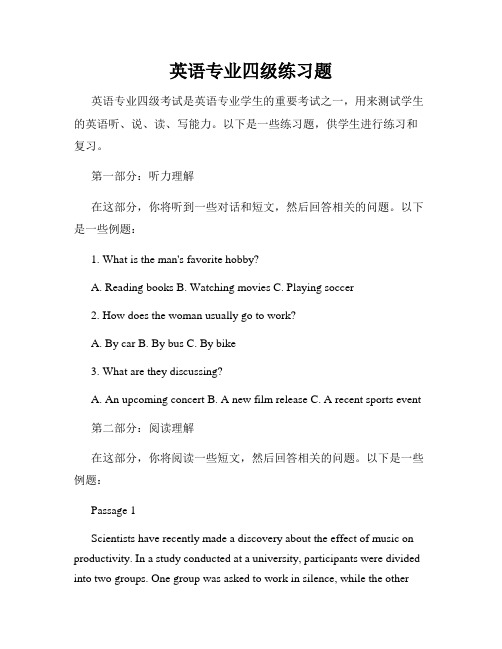
英语专业四级练习题英语专业四级考试是英语专业学生的重要考试之一,用来测试学生的英语听、说、读、写能力。
以下是一些练习题,供学生进行练习和复习。
第一部分:听力理解在这部分,你将听到一些对话和短文,然后回答相关的问题。
以下是一些例题:1. What is the man's favorite hobby?A. Reading booksB. Watching moviesC. Playing soccer2. How does the woman usually go to work?A. By carB. By busC. By bike3. What are they discussing?A. An upcoming concertB. A new film releaseC. A recent sports event第二部分:阅读理解在这部分,你将阅读一些短文,然后回答相关的问题。
以下是一些例题:Passage 1Scientists have recently made a discovery about the effect of music on productivity. In a study conducted at a university, participants were divided into two groups. One group was asked to work in silence, while the othergroup listened to instrumental music. The results showed that the group that listened to music had higher productivity levels and reported feeling more motivated.1. What was the purpose of the study?A. To test the effect of music on productivityB. To compare university students' work levelsC. To analyze the benefits of instrumental music2. What were the findings of the study?A. The group that listened to music had higher productivity levelsB. The group that worked in silence had higher motivation levelsC. The group that listened to music reported feeling more stressedPassage 2The concept of "living off the grid" has gained popularity in recent years. Many people are choosing to disconnect from the main power grid and rely on renewable energy sources. This lifestyle allows individuals to reduce their carbon footprint and live a more sustainable life. However, it also requires significant changes in daily routines and energy consumption patterns.1. What does "living off the grid" mean?A. Disconnecting from the main power gridB. Using renewable energy sourcesC. Reducing energy consumption2. What are the benefits of living off the grid?A. Reducing carbon footprint and living a sustainable lifeB. Saving money on energy billsC. Increasing reliance on non-renewable energy sources第三部分:写作能力在这部分,你将根据提供的提示写一篇短文。
专业英语四级考前复习模拟训练
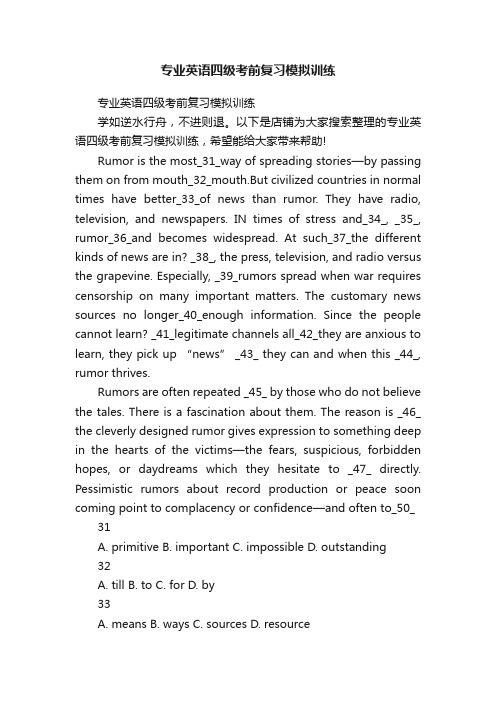
专业英语四级考前复习模拟训练专业英语四级考前复习模拟训练学如逆水行舟,不进则退。
以下是店铺为大家搜索整理的专业英语四级考前复习模拟训练,希望能给大家带来帮助!Rumor is the most_31_way of spreading stories—by passing them on from mouth_32_mouth.But civilized countries in normal times have better_33_of news than rumor. They have radio, television, and newspapers. IN times of stress and_34_, _35_, rumor_36_and becomes widespread. At such_37_the different kinds of news are in? _38_, the press, television, and radio versus the grapevine. Especially, _39_rumors spread when war requires censorship on many important matters. The customary news sources no longer_40_enough information. Since the people cannot learn? _41_legitimate channels all_42_they are anxious to lea rn, they pick up “news” _43_ they can and when this _44_, rumor thrives.Rumors are often repeated _45_ by those who do not believe the tales. There is a fascination about them. The reason is _46_ the cleverly designed rumor gives expression to something deep in the hearts of the victims—the fears, suspicious, forbidden hopes, or daydreams which they hesitate to _47_ directly. Pessimistic rumors about record production or peace soon coming point to complacency or confidence—and often to_50_31A. primitiveB. importantC. impossibleD. outstanding32A. tillB. toC. forD. by33A. meansB. waysC. sourcesD. resourceA. confusionB. peaceC. prosperityD. worried35A. andB. howeverC. soD. therefore36A. emergesB. immergeC. immerseD. immense37A. timeB. the timesC. timesD. the time38A. competeB. competitionC. commonD. harmony39A. doB. didC. areD. were40A. give upB. give offC. give outD. send off41A. throughB. byC. inD. across42A. whatB. whyC. whichD. that43A. whereverB. whereC. whateverD. what44A. happenedB. would happenC. happensD. happen45A. everB. evenC. foreverD. much46A. thatB. whatC. whyD. how47A. actB. viceC. behaveD. do48A. happyB. relievedC. crazyD. worriedA. BadB. PessimisiticC. OptimisticD. Good50A. overconfidenceB. overweightC. overconsiderateD. overproduce答案:31-40abcab acbac41-50adacb abdca。
大学生英语专四考试难度提升训练
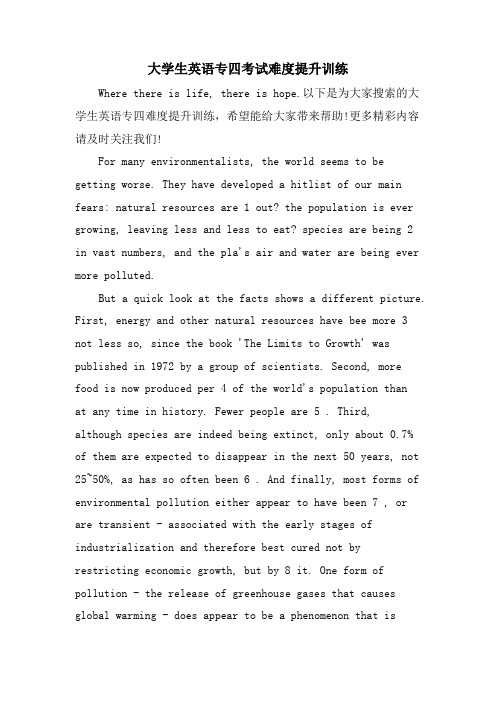
大学生英语专四考试难度提升训练Where there is life, there is hope.以下是为大家搜索的大学生英语专四难度提升训练,希望能给大家带来帮助!更多精彩内容请及时关注我们!For many environmentalists, the world seems to begetting worse. They have developed a hitlist of our main fears: natural resources are 1 out? the population is ever growing, leaving less and less to eat? species are being 2in vast numbers, and the pla's air and water are being ever more polluted.But a quick look at the facts shows a different picture. First, energy and other natural resources have bee more 3 not less so, since the book 'The Limits to Growth' was published in 1972 by a group of scientists. Second, more food is now produced per 4 of the world's population thanat any time in history. Fewer people are 5 . Third,although species are indeed being extinct, only about 0.7%of them are expected to disappear in the next 50 years, not 25~50%, as has so often been 6 . And finally, most forms of environmental pollution either appear to have been 7 , or are transient - associated with the early stages of industrialization and therefore best cured not byrestricting economic growth, but by 8 it. One form of pollution - the release of greenhouse gases that causes global warming - does appear to be a phenomenon that isgoing to extend well into our future, but its total impact is unlikely to 9 a devastating (令人心神不安的) problem. A bigger problem may well turn out to be an inappropriate response to it.Yet opinion polls suggest that many people nurture the belief that environmental standards are declining and some factors seem to cause this disjunction between 10 and reality.A) poseB) exaggeratedC) aeleratingD) extinctE) existF) perceptionG) wealthyH) magnifiedI) starvingJ) headK) runningL) predictedM) abundantN) conceptionO) reducing1. K2. D3. M4. J5. I6. L7. B8. C9. A10. F。
专四强化训练
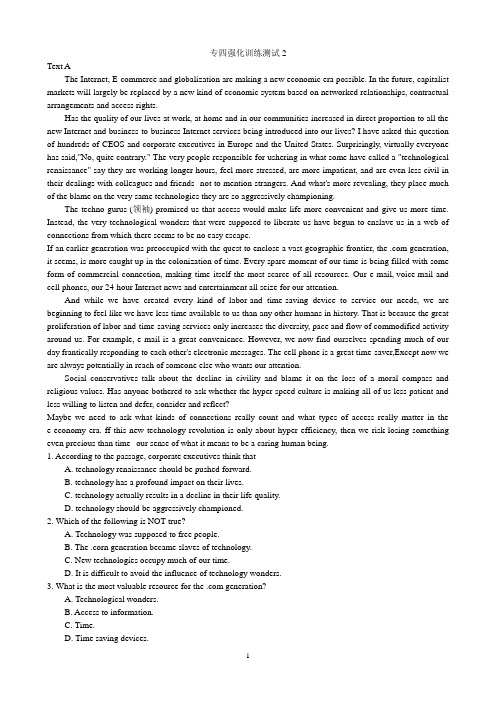
专四强化训练测试2Text AThe Internet, E-commerce and globalization are making a new economic era possible. In the future, capitalist markets will largely be replaced by a new kind of economic system based on networked relationships, contractual arrangements and access rights.Has the quality of our lives at work, at home and in our communities increased in direct proportion to all the new Internet and business-to-business Internet services being introduced into our lives? I have asked this question of hundreds of CEOS and corporate executives in Europe and the United States. Surprisingly, virtually everyone has said,"No, quite contrary." The very people responsible for ushering in what some have called a "technological renaissance" say they are working longer hours, feel more stressed, are more impatient, and are even less civil in their dealings with colleagues and friends--not to mention strangers. And what's more revealing, they place much of the blame on the very same technologies they are so aggressively championing.The techno gurus (领袖) promised us that access would make life more convenient and give us more time. Instead, the very technological wonders that were supposed to liberate us have begun to enslave us in a web of connections from which there seems to be no easy escape.If an earlier generation was preoccupied with the quest to enclose a vast geographic frontier, the .com generation, it seems, is more caught up in the colonization of time. Every spare moment of our time is being filled with some form of commercial connection, making time itself the most scarce of all resources. Our e-mail, voice mail and cell phones, our 24-hour Interact news and entertainment all seize for our attention.And while we have created every kind of labor-and time-saving device to service our needs, we are beginning to feel like we have less time available to us than any other humans in history. That is because the great proliferation of labor-and-time-saving services only increases the diversity, pace and flow of commodified activity around us. For example, e-mail is a great convenience. However, we now find ourselves spending much of our day frantically responding to each other's electronic messages. The cell phone is a great time-saver,Except now we are always potentially in reach of someone else who wants our attention.Social conservatives talk about the decline in civility and blame it on the loss of a moral compass and religious values. Has anyone bothered to ask whether the hyper speed culture is making all of us less patient and less willing to listen and defer, consider and reflect?Maybe we need to ask what kinds of connections really count and what types of access really matter in the e-economy era. ff this new technology revolution is only about hyper efficiency, then we risk losing something even precious than time--our sense of what it means to be a caring human being.1. According to the passage, corporate executives think thatA. technology renaissance should be pushed forward.B. technology has a profound impact on their lives.C. technology actually results in a decline in their life quality.D. technology should be aggressively championed.2. Which of the following is NOT true?A. Technology was supposed to free people.B. The .corn generation became slaves of technology.C. New technologies occupy much of our time.D. It is difficult to avoid the influence of technology wonders.3. What is the most valuable resource for the .com generation?A. Technological wonders.B. Access to information.C. Time.D. Time saving devices.4. In the sixth paragraph, the author implied thatA. social conservatives blamed the loss of morality on technology.B. the .com generation was less civil than the earlier generations.C. the hyper speed culture led to the decline in civility.D. technology might make people less impatient.5. An appropriate title for the passage might beA. The New Internet Life.B. The Drawbacks of too Much Access.C. The Failure of Technological Renaissance.D. The Declining Quality of Life.Text BWhat we know of prenatal development makes all this attempt made by a mother to mold the character of her unborn child by studying poetry, art, or mathematics during pregnancy seem utterly impossible. How could such extremely complex influences pass from the mother to the child? There is no connection between their nervous systems. Even the blood vessels of mother and child do not join directly. An emotional shock to the mother will affect her child, because it changes the activity of her glands and so the chemistry her blood. Any chemical change in the mother’s blood will affect the child for better or worse. But we can not see how a looking for mathematics or poetic genius can be dissolved in blood and produce a similar liking or genius in the child.In our discussion of instincts we saw that there was reason to believe that whatever we inherit must be of some very simple sort rather than any complicated or very definite kind of behavior. It is certain that no one inherits a knowledge of mathematics. It may be, however, that children inherit more or less of a rather general ability that we may call intelligence. If very intelligent children become deeply interested in mathematics, they will probably make a success of that study.As for musical ability, it may be that what is inherited is an especially sensitive ear, a peculiar structure of the hands or the vocal organs connections between nerves and muscles that make it comparatively easy to learn the movements a musician must execute, and particularly vigorous emotions. If these factors are all organized around music, the child may become a musician. The same factors, in other circumstance might be organized about some other center of interest. The rich emotional equipment might find expression in poetry. The capable fingers might develop skill in surgery. It is not the knowledge of music that is inherited, then nor even the love of it, but a certain bodily structure that makes it comparatively easy to acquire musical knowledge and skill. Whether that ability shall be directed toward music or some other undertaking may be decided entirely by forces in the environment in which a child grows up.6. Which of the following statements is not true?A. Some mothers try to influence their unborn children by studying art and other subjects during their pregnancy.B. It is utterly impossible for us to learn anything about prenatal development.C. he blood vessels of mother and child do not join directly.D. There are no connection between mother’s nervous systems and her unborn child’s.7. A mother will affect her unborn baby on the condition that ____.A. she is emotionally shockedB. she has a good knowledge of inheritanceC. she takes part in all kind of activitiesD. she sticks to studying8. According to the passage, a child may inherit____.A. everything from his motherB. a knowledge of mathematicsC. a rather general ability that we call intelligenceD. her mother’s musical ability9. If a child inherits something from his mother, such as an especially sensitive ear, a peculiar structure of the hands or of the vocal organs, he will ____.A. surely become musicianB. mostly become a poetC. possibly become a teacherD. become a musician on the condition that all these factors are organized around music10. Which of the following is the best title for the passage?A. Role of Inheritance.B. An Unborn Child.C. Function of instincts.D. Inherited Talents.Text CThere are many theories about the beginning of drama in ancient Greece. The one most widely accepted today is based on the assumption that drama evolved from ritual. The argument for this view goes as follows. In the beginning,human beings viewed the natural forces of the world,even the seasonal changes,as unpredictable,and they sought through various means,to control these unknown and feared powers. Those measures which appeared to bring the desired results were then retained and repeated until they hardened into fixed rituals. Eventually stories arose which explained or veiled the mysteries of the rites. As time passed some rituals were abandoned,but the stories,later called myths,persisted and provided material for art and drama.Those who believed that drama evolved out of ritual also argue that those rites contained the seed of theater because music,dance,masks,and costumes were almost always used. Furthermore,a suitable site had to be provided for performances,and when the entire community did not participate,a clear division was usually made between the "acting area" and the "auditorium". In addition,there were performers,and,since considerable importance was attached to avoiding mistakes in the enactment of rites,religious leaders usually assumed that task. Wearing masks and costumes,they often impersonated other people,animals,or supernatural beings,and mimed the desired effect-success in hunt or battle,the coming rain,the revival of the Sun-as an actor might. Eventually such dramatic representations were separated from religious activities.Another theory traces the theater‘s origin from the human interest in storytelling. According to this view,tales (about the hunt,war,or other feats)are gradually elaborated,at first through the use of impersonation,action,and dialogue by a narrator and then through the assumption of each of the roles by a different person. A closely related theory traces theater to those dances that are primarily rhythmical and gymnastic or that are imitations of animal movements and sounds.11. What does the passage mainly discuss?A. The origins of theater.B. The role of ritual in modern dance.C. The importance of storytelling.D. The variety of early religious activities.12. What aspect of drama does the author discuss in the first paragraph?A. The reason drama is often unpredictable.B. The seasons in which dramas were performed.C. The connection between myths and dramatic plots.D. The importance of costumes in early drama.13. Which of the following is NOT mentioned as a common element of theater and ritual?14. According to the passage,what is the main difference between ritual and drama?A. Ritual uses music whereas drama does not.B. Ritual is shorter than drama.C. Ritual requires fewer performers than drama.D. Ritual has a religious purpose and drama does not.15. The passage supports which of the following statements?A. No one really knows how the theater began.B. Myths are no longer represented dramatically.C. Storytelling is an important part of dance.D. Dramatic activities require the use of costumes.Text DWhen I was a child in Bra in Italy, hardly any mothers had a job, grandmothers lived with their children and grandchildren, and lunch and dinner were rites (仪式) you couldn't miss. Even if the world was collapsing around you, you would go home at a set time, sit down at the table and eat a full meal fondly prepared by the women of the house. Most ingredients came from local markets, though a lot of the vegetables were grown directly in our allotments, and meat came from animals raised by friends or acquaintances. The most "exotic" foods were bought at the neighborhood grocer's shop.This typically Italian family scene has changed radically. In the 1960s and 1970s, the advent of supermarkets and cheap, mass-produced food swathed community-based economies. The boom years brought new freedom and money to spend, on food but also on leisure. Women were emancipated at last and started to go out to work. Convenience foods were all the rage. Home-baked cakes and handmade pasta were out; factory-produced replicas were in. In the late 1980s, food processing became an out-and-out revolution. In the subsequent loss of domestic and artisanal (手工制作的) savoir-faire, traditional produce and biodiversity were threatened.The food production revolution that transformed Europe and North America meant more and cheaper food for all. But there were negative effects, too: environmental harm and a loss of cultural identity. Now that emerging nations are following in our footsteps, the downside is evident. If we can't force those countries who are starting to glimpse emancipation from poverty to avoid our bad examples, we can at least propose more sustainable models of producing food.It is important to trigger the virtuous processes that lead to food that tastes great, is ecologically benign, and is produced and consumed in a way that is fair to all. We must look to the past. We need to learn from what we have forgotten or set aside in the name of modernity. The values of rural societies are the values we have to restore to our food, and hence to our culture.These values teach us that food is better when it is fresh and seasonal, when it is produced close to home, and when it is eaten with the people we love. I'm not advocating a return to the family scene of my childhood; such environments were often indicative of poverty and social backwardness. And going back to the old days would force women back into the kitchen. But we can find ideas in the past that we might apply in our increasingly complex society, and so ensure a serene future for ourselves and the earth.Food is central to our lives. It would be wrong to turn it into nothing more than a fuel enabling us to move faster, hence accelerating the consumption of the earth and its resources. In fact, it would be the worst mistake we could ever make.16, We can learn from the beginning of the passageA. women were not willing to go out for work in the past.B. families ate lunch at a fixed time at home.C. most of the vegetables people ate were produced by themselves.D. foods sold in the grocer's shop were rare and fresh.17. "out-and-out" in Paragraph Two meansA. complete.B. successful.C. controversial.D. futile.18. Which of the following statements about changes that took place after 1960s is INCORRECT?A. There were more supermarkets and food was cheap.B. Women were freed from house chores and began to work.C. Home-baked cakes and handmade pasta disappeared.D. Traditional produce was threatened due to environmental pollution.19. We can learn from Paragraph 5 thatA. the author felt disappointed at the food production revolution.B. food is most delicious when it is fresh and homemade.C. the author would rather go back to his childhood.D. applying ideas in the past to modern society would do us good.20. The main purpose of the passage isA. to describe the Italian tradition.B. to explain the needs of modern food processing.C. to raise concern about sustainable food-producing.D. to persuade parents to make more homemade food.ClozeHave you ever wondered what our future is like? Practically all people _1_ a desire to predict their future _2_. Most people seem inclined to _3_ this task using causal reasoning. First we _4_ recognize that future circumstances are _5_ caused or conditioned by present ones. We learn that getting an education will _6_ how much money we earn later and that swimming beyond the reef may bring an unhappy _7_ with a shark.Second, people also learn that such _8_ of cause and effect are probabilistic(可能的) in nature. That is, the effects occur more often when the causes occur than when the causes are _9_, but not always. Thus, students learn that studying hard _10_ good grades in most instances, but not every time. Science makes these concepts of causality and probability more _11_ and provides techniques for dealing _12_ then more accurately than does causal human inquiry. In looking at ordinary human inquiry, we need to _13_ between prediction and understanding. Often, even if we don't understand why, we are willing to act _14_ the basis of a demonstrated predictive ability.Whatever the primitive drives _15_ motivate human beings, satisfying them depends heavily on the ability to _16_ future circumstances. The attempt to predict is often played in a _17_ of knowledge and understanding. If you can understand why certain regular patterns _18_, you can predict better than if you simply observe those patterns. Thus, human inquiry aims _19_ answering both "what" and "why" question, and we pursue these _20_ by observing and figuring out.1. [A]exhibit [B]exaggerate [C]examine [D]exceed2. [A]contexts [B]circumstances [C]inspections [D]intuitions3.[A]underestimate [B]undermine [C]undertake [D]undergo4. [A]specially [B]particularly [C]always [D]generally5. [A]somehow [B]somebody [C]someone [D]something6. [A]enact [B]affect [C]reflect [D]inflect7. [A]meeting [B]occurrence [C]encounter [D]contact8. [A]patterns [B]designs [C]arrangements[D]pictures9. [A]disappointed [B]absent [C]inadequate [D]absolute10.[A]creates [B]produces [C]loses [D]protects11.[A]obscure [B]indistinct [C]explicit [D]explosive12.[A]for [B]at [C]in [D]with13.[A]distinguish [B]distinct [C]distort [D]distract14.[A]at [B]on [C]to [D]under15.[A]why [B]how [C]that [D]where16.[A]predict [B]produce [C]pretend [D]precede17.[A]content [B]contact [C]contest [D]context18.[A]happen [B]occur [C]occupy [D]incur19.[A]at [B]on [C]to [D]beyond20.[A]purposes [B]ambitions [C]drives [D]goals。
公共英语四级阅读强化训练题

公共英语四级阅读强化训练题公共英语四级阅读强化训练题做阅读一定不能靠瞎蒙,认真理解文章和题目要求,以下是店铺分享给大家的.公共英语四级阅读强化训练题,希望能提升大家的阅读成绩。
Hawaii's native minority is demanding a greater degree of sovereignty over its own affairs. But much of the archipelago's political establishment, which includes the White Americans who dominated until the second world war and people of Japanese, Chinese and Filipino origins, is opposed to the idea.The islands were annexed by the US in 1898 and since then Hawaii's native peoples have fared worse than any of its other ethnic groups. They make up over 60 percent of the state's homeless, suffer higher levels of unemployment and their life span is five years less than the average Hawaiians. They are the only major US native group without some degree of autonomy.But a sovereignty advisory committee set up by Hawaii's first native governor, Joahn Waihee, has given the natives' cause a major boost by recommending that the Hawaiian natives decide by themselves whether to reestablish a sovereign Hawaiian nation.However, the Hawaiian natives are not united in their demands. Some just want greater autonomy within the state -- as enjoyed by many American Indian natives over matters such as education. This is a position supported by the Office of Hawaiian Affairs (OHA), a state agency set up in 1978 to represent the natives' interests and which has now become the moderate face of the native sovereignty movement. More ambitious is the Ka Lahui group, which declared itself a newnation in 1987 and wants full, official independence from the US.But if Hawaiian natives are given greater autonomy, it is far from clear how many people this will apply to. The state authorities only count as native those people with more than 50 percent Hawaiian blood.Native demands are not just based on political grievances, though. They also want their claim on 660,000 hectares of Hawaiian crown land to be accepted. It is on this issue that native groups are facing most opposition from the state authorities. In 1933, the state government paid the OHA US 136 million in back rent on the crown land and many officials say that by accepting this payment the agency has given up its claims to legally own the land. The OHA has vigorously disputed this.1. Hawaii's native minority refers to _________________.A. Hawaii's ethnic groupsB. people of Filipino originC. the Ka Lahui groupD. people with more than 50% Hawaiian blood2. Which of the following statements is true of the Hawaiian natives?A. Sixty percent of them are homeless or unemployed.B. their life span is 5 years shorter than average Americans.C. Their life is worse than that of other ethnic groups in Hawaii.D. They are the only native group without sovereignty.3. Which of the following is NOT true of John Waihee?A. He is Hawaii's first native governor.B. He has set up a sovereignty advisory committee.C. He suggested the native people decide for themselves.D. He is leading the local independence movement.4. Which of the following groups holds a less radical attitude on the matter of sovereignty?A. American Indian natives.B. Office of Hawaiian Affairs.C. The Ka Lahui group.D. The Hawaiian natives.5. Various native Hawaiians demand all the following EXCEPT ____________.A. a greater autonomy within the stateB. more back rent on the crown landC. a claim on the Hawaiian crown landD. full independence from the US参考答案:CDABD【公共英语四级阅读强化训练题】。
专四英语阅读强化训练题及答案

专四英语阅读强化训练题及答案Virtue and happiness are mother and daugher.以下是为大家搜索的专四强化训练题及答案,希望能给大家带来帮助!更多精彩内容请及时关注我们!Open up most fashion magazines and you will see incredibly thin models with impossible hair and wearing unreasonably expensive, impracticably styled clothes. But shouldn't clothes be fortably durable and make a principle of being simple for the individual who wears them? Why are we constantly told that we need to buy new clothes and add fresh pieces to our collection?Fashions change year after year so lots of people can make piles of money. If folks are convinced that they need a different look each season, that this year's sweater's length and shoes style are important, they can be persuaded to buy. The fashion industry would have you ignore your shortings and just make you feel beautiful and happy. In fact it is not only a phenomenon we can find in people's dressing.Fashion controls our lives. Fashion controls what we wear, what we eat, what we drink, the way we cut our hair, the makeup We buy and use, the color of the cars we drive. Fashion even controls our ideas.You don't believe me? How many. Of your friends are vegetarians? Why are they vegetarians? Because it is fashionable!Where does fashion e from? Often the reasons are quite logical. Scientists and historians study the fashions of the past and discover the secrets of each fashion.When girls see an attractive guy, their blood pressure rises and their lips bee redder. That's why guys think that girls wearing lipstick are beautiful.Why do guys shave their heads? In the past soldiers shaved their heads to kill the insects that lived in their hair. Now guys shave their heads so that they look strong and masculine, like soldiers.People spend a lot of time and money on fashion. But are they wasting their money? Changes in fashion help to develop new technologies. Changes in style create work for people all over the world. Many people work in the fashion industry, particularly in the fashion capitals of London, New York, Paris and Milan.And finally, fashion makes you feel good, doesn't it? When you are dressed in the latest style, dancing to the most fashionable music, after watching the latest hit film, you feel great, don't you?1. What's the author's viewpoint about the models and their hairstyles and clothes?A. Unbiased.B. Indifferent.C. Critical.D. Appreciative.2. It is indicated by the author that clothes should beA. fortable and durable.B. new and fresh.C. expensive and fashionable.D. simple and unique3. The fashion industry makes profits byA. selling the products at high prices.B. creating a need in you.C. helping you get rid of your shortings.D. making you look more beautiful.4. The author thinks what has been found about fashions by the scientists and the. historians isA. incredible.B. amazing.C. reasonable.D. creative.5. The passage mentions the advantages of fashion EXCEPT thatA. it can help promote technological development.B. it enables people to remain up-to-date.C. it can create more job opportunities for people.D. it can make people achieve a great feeling.1.[C]观点态度题。
- 1、下载文档前请自行甄别文档内容的完整性,平台不提供额外的编辑、内容补充、找答案等附加服务。
- 2、"仅部分预览"的文档,不可在线预览部分如存在完整性等问题,可反馈申请退款(可完整预览的文档不适用该条件!)。
- 3、如文档侵犯您的权益,请联系客服反馈,我们会尽快为您处理(人工客服工作时间:9:00-18:30)。
专四强化训练测试2Text AThe Internet, E-commerce and globalization are making a new economic era possible. In the future, capitalist markets will largely be replaced by a new kind of economic system based on networked relationships, contractual arrangements and access rights.Has the quality of our lives at work, at home and in our communities increased in direct proportion to all the new Internet and business-to-business Internet services being introduced into our lives? I have asked this question of hundreds of CEOS and corporate executives in Europe and the United States. Surprisingly, virtually everyone has said,"No, quite contrary." The very people responsible for ushering in what some have called a "technological renaissance" say they are working longer hours, feel more stressed, are more impatient, and are even less civil in their dealings with colleagues and friends--not to mention strangers. And what's more revealing, they place much of the blame on the very same technologies they are so aggressively championing.The techno gurus (领袖) promised us that access would make life more convenient and give us more time. Instead, the very technological wonders that were supposed to liberate us have begun to enslave us in a web of connections from which there seems to be no easy escape.If an earlier generation was preoccupied with the quest to enclose a vast geographic frontier, the .com generation, it seems, is more caught up in the colonization of time. Every spare moment of our time is being filled with some form of commercial connection, making time itself the most scarce of all resources. Our e-mail, voice mail and cell phones, our 24-hour Interact news and entertainment all seize for our attention.And while we have created every kind of labor-and time-saving device to service our needs, we are beginning to feel like we have less time available to us than any other humans in history. That is because the great proliferation of labor-and-time-saving services only increases the diversity, pace and flow of commodified activity around us. For example, e-mail is a great convenience. However, we now find ourselves spending much of our day frantically responding to each other's electronic messages. The cell phone is a great time-saver,Except now we are always potentially in reach of someone else who wants our attention.Social conservatives talk about the decline in civility and blame it on the loss of a moral compass and religious values. Has anyone bothered to ask whether the hyper speed culture is making all of us less patient and less willing to listen and defer, consider and reflect?Maybe we need to ask what kinds of connections really count and what types of access really matter in the e-economy era. ff this new technology revolution is only about hyper efficiency, then we risk losing something even precious than time--our sense of what it means to be a caring human being.1. According to the passage, corporate executives think thatA. technology renaissance should be pushed forward.B. technology has a profound impact on their lives.C. technology actually results in a decline in their life quality.D. technology should be aggressively championed.2. Which of the following is NOT true?A. Technology was supposed to free people.B. The .corn generation became slaves of technology.C. New technologies occupy much of our time.D. It is difficult to avoid the influence of technology wonders.3. What is the most valuable resource for the .com generation?A. Technological wonders.B. Access to information.C. Time.D. Time saving devices.4. In the sixth paragraph, the author implied thatA. social conservatives blamed the loss of morality on technology.B. the .com generation was less civil than the earlier generations.C. the hyper speed culture led to the decline in civility.D. technology might make people less impatient.5. An appropriate title for the passage might beA. The New Internet Life.B. The Drawbacks of too Much Access.C. The Failure of Technological Renaissance.D. The Declining Quality of Life.Text BWhat we know of prenatal development makes all this attempt made by a mother to mold the character of her unborn child by studying poetry, art, or mathematics during pregnancy seem utterly impossible. How could such extremely complex influences pass from the mother to the child? There is no connection between their nervous systems. Even the blood vessels of mother and child do not join directly. An emotional shock to the mother will affect her child, because it changes the activity of her glands and so the chemistry her blood. Any chemical change in the mother’s blood will affect the child for better or worse. But we can not see how a looking for mathematics or poetic genius can be dissolved in blood and produce a similar liking or genius in the child.In our discussion of instincts we saw that there was reason to believe that whatever we inherit must be of some very simple sort rather than any complicated or very definite kind of behavior. It is certain that no one inherits a knowledge of mathematics. It may be, however, that children inherit more or less of a rather general ability that we may call intelligence. If very intelligent children become deeply interested in mathematics, they will probably make a success of that study.As for musical ability, it may be that what is inherited is an especially sensitive ear, a peculiar structure of the hands or the vocal organs connections between nerves and muscles that make it comparatively easy to learn the movements a musician must execute, and particularly vigorous emotions. If these factors are all organized around music, the child may become a musician. The same factors, in other circumstance might be organized about some other center of interest. The rich emotional equipment might find expression in poetry. The capable fingers might develop skill in surgery. It is not the knowledge of music that is inherited, then nor even the love of it, but a certain bodily structure that makes it comparatively easy to acquire musical knowledge and skill. Whether that ability shall be directed toward music or some other undertaking may be decided entirely by forces in the environment in which a child grows up.6. Which of the following statements is not true?A. Some mothers try to influence their unborn children by studying art and other subjects during their pregnancy.B. It is utterly impossible for us to learn anything about prenatal development.C. he blood vessels of mother and child do not join directly.D. There are no connection between mother’s nervous systems and her unborn child’s.7. A mother will affect her unborn baby on the condition that ____.A. she is emotionally shockedB. she has a good knowledge of inheritanceC. she takes part in all kind of activitiesD. she sticks to studying8. According to the passage, a child may inherit____.A. everything from his motherB. a knowledge of mathematicsC. a rather general ability that we call intelligenceD. her mother’s musical ability9. If a child inherits something from his mother, such as an especially sensitive ear, a peculiar structure of the hands or of the vocal organs, he will ____.A. surely become musicianB. mostly become a poetC. possibly become a teacherD. become a musician on the condition that all these factors are organized around music10. Which of the following is the best title for the passage?A. Role of Inheritance.B. An Unborn Child.C. Function of instincts.D. Inherited Talents.Text CThere are many theories about the beginning of drama in ancient Greece. The one most widely accepted today is based on the assumption that drama evolved from ritual. The argument for this view goes as follows. In the beginning,human beings viewed the natural forces of the world,even the seasonal changes,as unpredictable,and they sought through various means,to control these unknown and feared powers. Those measures which appeared to bring the desired results were then retained and repeated until they hardened into fixed rituals. Eventually stories arose which explained or veiled the mysteries of the rites. As time passed some rituals were abandoned,but the stories,later called myths,persisted and provided material for art and drama.Those who believed that drama evolved out of ritual also argue that those rites contained the seed of theater because music,dance,masks,and costumes were almost always used. Furthermore,a suitable site had to be provided for performances,and when the entire community did not participate,a clear division was usually made between the "acting area" and the "auditorium". In addition,there were performers,and,since considerable importance was attached to avoiding mistakes in the enactment of rites,religious leaders usually assumed that task. Wearing masks and costumes,they often impersonated other people,animals,or supernatural beings,and mimed the desired effect-success in hunt or battle,the coming rain,the revival of the Sun-as an actor might. Eventually such dramatic representations were separated from religious activities.Another theory traces the theater‘s origin from the human interest in storytelling. According to this view,tales (about the hunt,war,or other feats)are gradually elaborated,at first through the use of impersonation,action,and dialogue by a narrator and then through the assumption of each of the roles by a different person. A closely related theory traces theater to those dances that are primarily rhythmical and gymnastic or that are imitations of animal movements and sounds.11. What does the passage mainly discuss?A. The origins of theater.B. The role of ritual in modern dance.C. The importance of storytelling.D. The variety of early religious activities.12. What aspect of drama does the author discuss in the first paragraph?A. The reason drama is often unpredictable.B. The seasons in which dramas were performed.C. The connection between myths and dramatic plots.D. The importance of costumes in early drama.13. Which of the following is NOT mentioned as a common element of theater and ritual?14. According to the passage,what is the main difference between ritual and drama?A. Ritual uses music whereas drama does not.B. Ritual is shorter than drama.C. Ritual requires fewer performers than drama.D. Ritual has a religious purpose and drama does not.15. The passage supports which of the following statements?A. No one really knows how the theater began.B. Myths are no longer represented dramatically.C. Storytelling is an important part of dance.D. Dramatic activities require the use of costumes.Text DWhen I was a child in Bra in Italy, hardly any mothers had a job, grandmothers lived with their children and grandchildren, and lunch and dinner were rites (仪式) you couldn't miss. Even if the world was collapsing around you, you would go home at a set time, sit down at the table and eat a full meal fondly prepared by the women of the house. Most ingredients came from local markets, though a lot of the vegetables were grown directly in our allotments, and meat came from animals raised by friends or acquaintances. The most "exotic" foods were bought at the neighborhood grocer's shop.This typically Italian family scene has changed radically. In the 1960s and 1970s, the advent of supermarkets and cheap, mass-produced food swathed community-based economies. The boom years brought new freedom and money to spend, on food but also on leisure. Women were emancipated at last and started to go out to work. Convenience foods were all the rage. Home-baked cakes and handmade pasta were out; factory-produced replicas were in. In the late 1980s, food processing became an out-and-out revolution. In the subsequent loss of domestic and artisanal (手工制作的) savoir-faire, traditional produce and biodiversity were threatened.The food production revolution that transformed Europe and North America meant more and cheaper food for all. But there were negative effects, too: environmental harm and a loss of cultural identity. Now that emerging nations are following in our footsteps, the downside is evident. If we can't force those countries who are starting to glimpse emancipation from poverty to avoid our bad examples, we can at least propose more sustainable models of producing food.It is important to trigger the virtuous processes that lead to food that tastes great, is ecologically benign, and is produced and consumed in a way that is fair to all. We must look to the past. We need to learn from what we have forgotten or set aside in the name of modernity. The values of rural societies are the values we have to restore to our food, and hence to our culture.These values teach us that food is better when it is fresh and seasonal, when it is produced close to home, and when it is eaten with the people we love. I'm not advocating a return to the family scene of my childhood; such environments were often indicative of poverty and social backwardness. And going back to the old days would force women back into the kitchen. But we can find ideas in the past that we might apply in our increasingly complex society, and so ensure a serene future for ourselves and the earth.Food is central to our lives. It would be wrong to turn it into nothing more than a fuel enabling us to move faster, hence accelerating the consumption of the earth and its resources. In fact, it would be the worst mistake we could ever make.16, We can learn from the beginning of the passageA. women were not willing to go out for work in the past.B. families ate lunch at a fixed time at home.C. most of the vegetables people ate were produced by themselves.D. foods sold in the grocer's shop were rare and fresh.17. "out-and-out" in Paragraph Two meansA. complete.B. successful.C. controversial.D. futile.18. Which of the following statements about changes that took place after 1960s is INCORRECT?A. There were more supermarkets and food was cheap.B. Women were freed from house chores and began to work.C. Home-baked cakes and handmade pasta disappeared.D. Traditional produce was threatened due to environmental pollution.19. We can learn from Paragraph 5 thatA. the author felt disappointed at the food production revolution.B. food is most delicious when it is fresh and homemade.C. the author would rather go back to his childhood.D. applying ideas in the past to modern society would do us good.20. The main purpose of the passage isA. to describe the Italian tradition.B. to explain the needs of modern food processing.C. to raise concern about sustainable food-producing.D. to persuade parents to make more homemade food.ClozeHave you ever wondered what our future is like? Practically all people _1_ a desire to predict their future _2_. Most people seem inclined to _3_ this task using causal reasoning. First we _4_ recognize that future circumstances are _5_ caused or conditioned by present ones. We learn that getting an education will _6_ how much money we earn later and that swimming beyond the reef may bring an unhappy _7_ with a shark.Second, people also learn that such _8_ of cause and effect are probabilistic(可能的) in nature. That is, the effects occur more often when the causes occur than when the causes are _9_, but not always. Thus, students learn that studying hard _10_ good grades in most instances, but not every time. Science makes these concepts of causality and probability more _11_ and provides techniques for dealing _12_ then more accurately than does causal human inquiry. In looking at ordinary human inquiry, we need to _13_ between prediction and understanding. Often, even if we don't understand why, we are willing to act _14_ the basis of a demonstrated predictive ability.Whatever the primitive drives _15_ motivate human beings, satisfying them depends heavily on the ability to _16_ future circumstances. The attempt to predict is often played in a _17_ of knowledge and understanding. If you can understand why certain regular patterns _18_, you can predict better than if you simply observe those patterns. Thus, human inquiry aims _19_ answering both "what" and "why" question, and we pursue these _20_ by observing and figuring out.1. [A]exhibit [B]exaggerate [C]examine [D]exceed2. [A]contexts [B]circumstances [C]inspections [D]intuitions3.[A]underestimate [B]undermine [C]undertake [D]undergo4. [A]specially [B]particularly [C]always [D]generally5. [A]somehow [B]somebody [C]someone [D]something6. [A]enact [B]affect [C]reflect [D]inflect7. [A]meeting [B]occurrence [C]encounter [D]contact8. [A]patterns [B]designs [C]arrangements[D]pictures9. [A]disappointed [B]absent [C]inadequate [D]absolute10.[A]creates [B]produces [C]loses [D]protects11.[A]obscure [B]indistinct [C]explicit [D]explosive12.[A]for [B]at [C]in [D]with13.[A]distinguish [B]distinct [C]distort [D]distract14.[A]at [B]on [C]to [D]under15.[A]why [B]how [C]that [D]where16.[A]predict [B]produce [C]pretend [D]precede17.[A]content [B]contact [C]contest [D]context18.[A]happen [B]occur [C]occupy [D]incur19.[A]at [B]on [C]to [D]beyond20.[A]purposes [B]ambitions [C]drives [D]goals。
